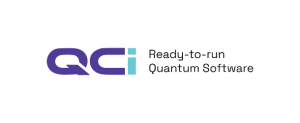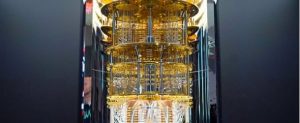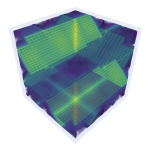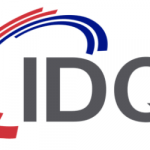Quantum News Briefs October 6: Untappable internet for Port of Rotterdam offered by quantum technology; Quantum Computing Inc. selected as a partner for risk-based flight trajectories by VIPC; Czechia will host the European LUMI-Q quantum computer & MORE

Quantum News Briefs October 6 opens with news of the Port of Rotterdam’s use of an untappable, multi-user quantum network using QuTech’s Q*Bird followed by the Virginia Innovation Partnership Corporation’s selection of QCI to determine optimal flight trajectories for unmanned aerial vehicles. Third is notice that Czechia will host the European LUMI-Q quantum computer and MORE.
*****
Quantum internet system using QuTech’s spin-off Q*Bird projected to be a game-changer at the Rotterdam Port

The Port of Rotterdam stakeholders will be able to participate and benefit from an untappable, multi-user quantum network for their critical communication systems using QuTech’s spin-off Q*Bird. Quantum News Briefs summarizes the news release.
This system is the first to deploy a new type secure quantum network that can connect multiple users via a center hub in a cost-effective and scalable manner. This will ensure an untappable internet connection between many users, spread out throughout the harbour area.
The Port of Rotterdam represents a significant portion of the Dutch economy, handles almost 15 million shipping containers yearly and is therefore one of the largest ports in the world. Securing its communication systems will improve the safety of tens of thousands of sea ships yearly and for a significant part the economical traffic that comes after.
Previously a team of scientists and engineers at QuTech—a collaboration between the Delft University of Technology and TNO—has demonstrated an alternative, untappable method for sending encrypted information. The technology has such commercial potential that they have decided to spin-off out of QuTech under the name of Q*Bird. “Our technology is based on a special implementation of quantum key distribution (QKD) that uses a central hub to connect users that want to exchange secure communications,” explains Q*Bird’s co-founder and director Remon Berrevoets. “That means that it is possible to implement a quantum network in a cost-effective way, scalable to many end-users, and using mostly off-the-shelf equipment.”
As a first step, the central hub of the system will be situated at Port of Rotterdam Authority and will connect users at Portbase, and two or three other maritime logistic companies that are based in the port of Rotterdam. The multi-user capabilities of the central hub allow for later additions of i.e. barges and pilot organization to the network. In due course, other end-users can be connected to the system too, for example: third party customers, suppliers, and emergency services.
Click to read in detail on QuTech site
****
VIPC Selects Quantum Computing Inc. as a partner for risk-based llight trajectories
 The Virginia Innovation Partnership Corporation (VIPC) has announced a partnership with Quantum Computing Inc. (QCI) (NASDAQ: QUBT), a Virginia-based emerging leader in accessible quantum computing, to determine optimal flight trajectories for unmanned aerial vehicles leveraging QCI’s Path to Quantum consulting, Qatalyst software, and Quantum Photonic Systems hardware.
The Virginia Innovation Partnership Corporation (VIPC) has announced a partnership with Quantum Computing Inc. (QCI) (NASDAQ: QUBT), a Virginia-based emerging leader in accessible quantum computing, to determine optimal flight trajectories for unmanned aerial vehicles leveraging QCI’s Path to Quantum consulting, Qatalyst software, and Quantum Photonic Systems hardware.
QCI will apply its quantum photonic systems to a critical risk-management use case involving the selection of flight trajectories for unmanned aerial vehicles. Under this effort QCI will identify the optimal time, speed, and route for drone aircraft to traverse among destinations, while satisfying airspace constraints and minimizing risks related to weather, obstacles, and other aircraft through the use of QCI’s Entropy Quantum Computing (EQC) systems.
Risk-based decision making is a real-world problem identified as a key strategic priority by the Federal Aviation Administration. QCI’s Entropy Quantum Computing systems are well-suited to solving complex optimization problems, and show the potential to quickly identify optimized flight paths that minimize costs and in-flight risks.
VIPC is the nonprofit commercialization and seed stage economic development driver in the Commonwealth that leads funding, infrastructure, and policy initiatives to support Virginia’s innovators, entrepreneurs, startups, and market development strategies. VIPC collaborates with local, regional, state, and federal partners to support the expansion and diversification of Virginia’s economy and at the development of emerging technologies like quantum computing within the Commonwealth of Virginia to improve competitiveness and attract more commercial opportunities to the state.
As a part of this project, QCI and VIPC plan to leverage sensor and micro-weather data collected by the Virginia Flight Information Exchange (VA-FIX), an information hub focused on providing authoritative state and local data in support of unmanned aerial systems. VIPC sees these components as key leading-edge technologies for advanced air mobility in Virginia.
*****
Czechia will host the European LUMI-Q quantum computer

The European Joint Undertaking EuroHPC has selected sites to host new European quantum computers. The LUMI-Q consortium is among the projects chosen, and its quantum computer will be located in Czechia at the IT4Innovations National Supercomputing Centre in Ostrava.
LUMI-Q will set up, operate, and make a new European quantum computer available for the entire EuroHPC user base. The consortium follows the work of the LUMI consortium, which built and now operates Europe’s most powerful pre-exascale supercomputer, LUMI, located in Finland. The members of LUMI-Q are some of the existing members of the LUMI consortium, namely Finland, Sweden, Denmark, Poland, Norway, and Belgium, and the project leader, Czechia, joined by the Netherlands and Germany.
LUMI-Q builds on the success of the LUMI consortium, which currently operates the most powerful supercomputer in Europe. Through LUMI-Q, the LUMI ecosystem becomes increasingly inclusive, from both technological and regional perspectives, says Kimmo Koski, Managing Director, CSC.
The LUMI-Q consortium will provide a European-wide quantum computing environment integrated with the EuroHPC infrastructure. The proposed concept allows the integration of the targeted EuroHPC quantum computer into multiple EuroHPC supercomputers, including KAROLINA in Czechia, LUMI in Finland, and EHPCPL in Poland.
*****
South Korea opens quantum tech cooperation center in Washington for joint projects with U.S.
 South Korea has opened a quantum technology cooperation center in Washington to handle joint research and development projects in the field with U.S. partners, according to Korea’s Ministry of Science. Quantum News Briefs shares the announcement from YonHaps News Agency.
South Korea has opened a quantum technology cooperation center in Washington to handle joint research and development projects in the field with U.S. partners, according to Korea’s Ministry of Science. Quantum News Briefs shares the announcement from YonHaps News Agency.
The ministry recently held an opening ceremony of the Korea-US Quantum Technology Cooperation Center in Washington attended by some 30 South Korean and U.S. officials and experts in the field of quantum studies.
The center was established as part of a follow-up measure to a South Korea-U.S. summit in May. It will provide support for projects between South Korean academic and research institutions and their American counterparts in quantum studies.
South Korea plans to open a similar center in Europe next year.
*****
Sandra K. Helsel, Ph.D. has been researching and reporting on frontier technologies since 1990. She has her Ph.D. from the University of Arizona.























